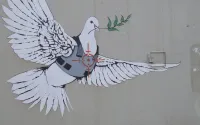18 May 2007Ahmed Abdullah
It’s not the first time Chatham House, also known as the Royal Institute of International Affairs, has been highly critical of the U.S. and UK strategies in Iraq. But the new report, entitled Accepting Realities in Iraq, paints an exceptionally bleak picture of the war-torn country.
The author of the report, Dr Gareth Stansfield, a Middle East expert, said that the Iraqi government has lost control of vast areas to powerful local factions, arguing that there isn’t one civil war in Iraq, but “several civil wars” between rival communities. "The Iraqi government is not able to exert authority evenly or effectively over the country. Across huge swathes of territory, it is largely irrelevant in terms of ordering social, economic and political life…The internecine fighting and continual struggle for power threatens the nation’s very existence in its current form," he said.
Calling for a radical change in American and British strategy to try to contain the situation, Dr Stansfield said: “these current harsh realities need to be accepted if new strategies are to have any chance of preventing the failure and collapse of Iraq". He also said that Iraq’s neighbors have a greater capacity to stabilize the war-torn country than either the U.S. or the UK.
However, Dr Stansfield said that instability in Iraq was "not necessarily contrary to the interests" of Iran, Saudi Arabia and Turkey. "(Iraq) is now a theatre in which Iran can 'fight' the U.S. without doing so openly," he said, adding that Tehran was the "most capable foreign power" in Iraq in terms of influencing future events, even more than the United States.
The rise to power of Iraq's long-oppressed Shia majority has caused concern in Sunni Gulf states, particularly Saudi Arabia, which deeply distrusts non-Arab, Shia Iran’s influence in Iraq, Dr Stansfield wrote. Should a U.S. withdrawal herald the beginning of a full-scale Sunni-Shia civil war in Iraq, Saudi Arabia "might not stand by," he said, "with the possibility of Iran and Saudi Arabia fighting each other through proxies in Iraq."
The 12-page report also proposed a political solution that would require “Sunni Arab representatives’ participation in government, the recognition of (Shia cleric) Moqtada al-Sadr as a legitimate political partner, and a positive response to Kurdish concerns.”
While cautioning that Iraq might not ultimately exist as a united entity, Dr Stansfield said a draft law to distribute Iraq's oil wealth equitably among Sunni Arabs, Shias and ethnic Kurds was "the key to ensuring Iraq's survival."
"It will be oil revenue that keeps the state together rather than any attempt to build a coherent national project in the short term," he said.
The oil revenue-sharing law, among political benchmarks Washington set for Baghdad as key steps to end sectarian violence, has yet to be approved by parliament. Ethnic Kurds, whose autonomous Kurdistan region holds large unproven reserves, oppose the draft's wording.
Dr Stansfield also said that the American “surge” strategy, ordered by President Bush four months ago, has failed to improve Baghdad’s security, as it moved violence to different areas but didn’t overcome it. Despite the troop buildup, U.S. forces appear to have "simply pushed insurgent activity to neighboring cities" and cannot create conditions that will resolve political differences among various groups.
There’s a growing sense in London and Washington that the military commander in Iraq, Gen. David Petraeus, will ask for more time to continue the “surge” when he reports on its progress next September. This will confront President Bush with a real dilemma, because he vetoed a Democrat-backed a bill that would have set a deadline for the withdrawal of U.S. forces from Iraq.
War opponents believe that Bush’s veto means that the American president should be held accountable alone for the U.S. continued military presence in Iraq, and the growing casualties there.
http://www.aljazeera.com/me.asp?service_ID=13373





